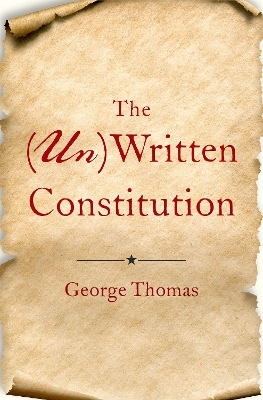
The (Un)Written Constitution
Oxford University Press Inc (Verlag)
978-0-19-755597-2 (ISBN)
The late Justice Scalia relished pointing to departures from the written text of the Constitution as a departure from Constitutional law itself, but in fact his own jurisprudence relied on unwritten ideas. Given that Scalia's "textualist" approach to constitutional interpretation has become even more prominent in recent years with the elevation of Justices Gorsuch, Kavanaugh, and Barrett--all jurists in the mold of Scalia--to the Supreme Court, it is crucial that the public understands that these textualists all rely on unwritten ideas when they interpret the Constitution. Indeed, our most intense debates about America's written Constitution are not about constitutional text, but about the unwritten ideas and understandings that guide our reading of the text.
In The (Un)Written Constitution, George Thomas makes these ideas visible by turning to the practices of Supreme Court justices and political actors in interpreting the Constitution over more than two centuries. From founding debates about freedom of speech and religion to contemporary arguments about judicial review, the separation of powers, same--sex marriage, and partisan gerrymandering, he highlights the too--often unacknowledged ideas that animate our debates about the written Constitution. Contrary to the self-identified textualists, Thomas argues, these recurrent debates are not about whether to follow the text. Rather, they are disputes about what fidelity to the text requires.
Illuminating how moving beyond the text is an inescapable feature of interpreting the written Constitution, this concise primer on constitutional interpretation forces us to consider the text--and the unstated principles that lie beneath it-in a new light.
George Thomas is Wohlford Professor of American Political Institutions and Director of the Salvatori Center for the Study of Individual Freedom at Claremont McKenna College. He is the author of The Madisonian Constitution and The Founders and the Idea of a National University: Constituting the American Mind, and co-author of the two-volume American Constitutional Law: Essays, Cases, and Comparative Notes. He has published numerous scholarly articles on Constitutional Law and American Constitutionalism, and his essays have appeared in The Atlantic and The Washington Post. He has received fellowships from the National Endowment for the Humanities and the Huntington Library, and is the recipient of the Alexander George Award from the American Political Science Association.
Introduction: Interpreting a Written Constitution
Chapter 1 Text and Textualism
Chapter 2 Text and Originalism
Chapter 3 Text and Republican Government
Chapter 4 Text and the Separation of Powers
Chapter 5 Text and Unwritten Understandings
Conclusion: The Inescapability of Constitutional Judgment
Notes
Index
| Erscheinungsdatum | 01.11.2021 |
|---|---|
| Verlagsort | New York |
| Sprache | englisch |
| Maße | 216 x 149 mm |
| Gewicht | 336 g |
| Themenwelt | Recht / Steuern ► Allgemeines / Lexika |
| Recht / Steuern ► EU / Internationales Recht | |
| Recht / Steuern ► Öffentliches Recht | |
| Sozialwissenschaften ► Politik / Verwaltung ► Vergleichende Politikwissenschaften | |
| ISBN-10 | 0-19-755597-7 / 0197555977 |
| ISBN-13 | 978-0-19-755597-2 / 9780197555972 |
| Zustand | Neuware |
| Informationen gemäß Produktsicherheitsverordnung (GPSR) | |
| Haben Sie eine Frage zum Produkt? |
aus dem Bereich


